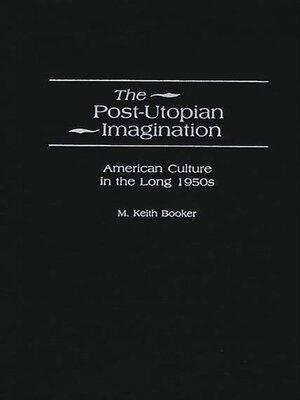The Post-Utopian Imagination
ebook ∣ American Culture in the Long 1950s · Contributions to the Study of American Literature
By M. Keith Booker

Sign up to save your library
With an OverDrive account, you can save your favorite libraries for at-a-glance information about availability. Find out more about OverDrive accounts.
Find this title in Libby, the library reading app by OverDrive.



Search for a digital library with this title
Title found at these libraries:
| Library Name | Distance |
|---|---|
| Loading... |
In America, the long 1950s were marked by an intense skepticism toward utopian alternatives to the existing capitalist order. This skepticism was closely related to the climate of the Cold War, in which the demonization of socialism contributed to a dismissal of all alternatives to capitalism. This book studies how American novels and films of the long 1950s reflect the loss of the utopian imagination and mirror the growing concern that capitalism brought routinization, alienation, and other dehumanizing consequences. The volume relates the decline of the utopian vision to the rise of late capitalism, with its expanding globalization and consumerism, and to the beginnings of postmodernism.
In addition to well-known literary novels, such as Nabokov's Lolita, Booker explores a large body of leftist fiction, popular novels, and the films of Alfred Hitchcock and Walt Disney. The book argues that while the canonical novels of the period employ a utopian aesthetic, that aesthetic tends to be very weak and is not reinforced by content. The leftist novels, on the other hand, employ a realist aesthetic but are utopian in their exploration of alternatives to capitalism. The study concludes that the utopian energies in cultural productions of the long 1950s are very weak, and that these works tend to dismiss utopian thinking as na^Dive or even sinister. The weak utopianism in these works tends to be reflected in characteristics associated with postmodernism.
In addition to well-known literary novels, such as Nabokov's Lolita, Booker explores a large body of leftist fiction, popular novels, and the films of Alfred Hitchcock and Walt Disney. The book argues that while the canonical novels of the period employ a utopian aesthetic, that aesthetic tends to be very weak and is not reinforced by content. The leftist novels, on the other hand, employ a realist aesthetic but are utopian in their exploration of alternatives to capitalism. The study concludes that the utopian energies in cultural productions of the long 1950s are very weak, and that these works tend to dismiss utopian thinking as na^Dive or even sinister. The weak utopianism in these works tends to be reflected in characteristics associated with postmodernism.







